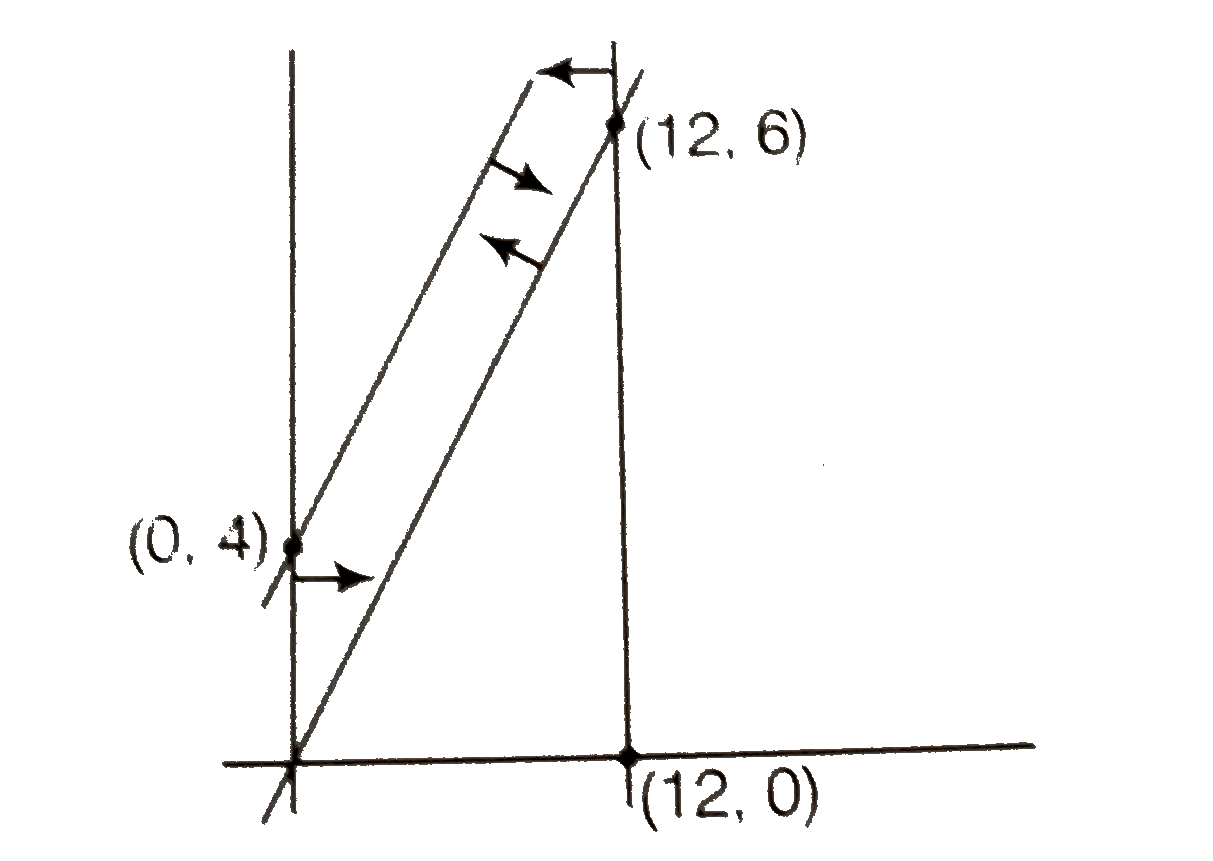Corner points of the feasible region for an LPP are (0, 2), (3, 0), (6, 0), (6, 8) and (0, 5).
Let F = 4x + 6y be the objective function. (Maximum of F)-(Minimum of F) = Solution in Gujrati
60
48
42
18
The correct Answer is:A
Step by step video, text & image solution for Corner points of the feasible region for an LPP are (0, 2), (3, 0), (6, 0), (6, 8) and (0, 5). Let F = 4x + 6y be the objective function. (Maximum of F)-(Minimum of F) = by Maths experts to help you in doubts & scoring excellent marks in Class 12 exams.
Topper's Solved these Questions
- BOOK - KUMAR PRAKASHANCHAPTER - LINEAR PROGRAMMINGEXERCISE - MULTIPLE CHOICE QUESTIONS42videos
LINEAR PROGRAMMING
- BOOK - KUMAR PRAKASHANCHAPTER - LINEAR PROGRAMMINGEXERCISE - PRACTICE PAPER - 1214videos
LINEAR PROGRAMMING
- BOOK - KUMAR PRAKASHANCHAPTER - LINEAR PROGRAMMINGEXERCISE - TEXTBOOK ILLUSTRATIONS FOR PRACTICE WORK11videos
LINEAR PROGRAMMING
- BOOK - KUMAR PRAKASHANCHAPTER - INVERSE TRIGONOMETRIC FUNCTIONSEXERCISE - PRACTICE PAPER - 2 (SECTION - D)2videos
INVERSE TRIGONOMETRIC FUNCTIONS
- BOOK - KUMAR PRAKASHANCHAPTER - MATRICES EXERCISE - Practice Paper - 3 (Section - D)1videos
MATRICES
Similar Questions
Solution set of the inequality 2x+y>5 is ………
01:21View SolutionThe correct points of the feasible region determined by the following system of linear inequalities, 2x+y≤10,x+3y≤15,x,y≥0, are (0, 0), (5, 0), (3, 4) and (0, 5). Let Z = px + qy, where p,q>0. Condition on p and q so that the maximum of Z occurs at both (3, 4) and (0, 5) is ..........
01:39View SolutionSolve the following linear programming problem graphically :
Maximise Z = 4x + y …(1)
subject to the constraints :
x+y≤50 …(2)
3x+y≤90…(3)"
x≥0,y≥0 ...(4)01:11View SolutionProve that :
cot−1(√1+sinx+√1−sinx√1+sinx−√1−sinx)=x2,x∈(0,π4)02:44View SolutionFor matrix A=⎡⎢⎣11112−32−13⎤⎥⎦ . Prove that , A3−6A2+5A+11I=0. Hence find A−1 using it .
01:50View SolutionThe feasible region for an LPP is shown in the following figure. Let F=3x−4y be the objective function. Maximum value of F is
 01:39View Solution
01:39View SolutionCorner points of the feasible region for an LPP are (0,2),(3,0),(6,0),(6,8), and (0,5). Let F=4x+6y be the objective function. Determine the minimum value of F occurs at
02:17View SolutionIn a LPP, the maximum value of the objective function Z = ax +by is always 0, if origin is one of the corner point of the feasible region.
02:20View SolutionCorner points of the feasible region for an LPP are (0,2),(3,0),(6,0),(6,8), and (0,5). Let F-4x+6y be the objective function. Determine the minimum valur of F occurs at
02:54View SolutionIn a LPP, the maximum value of the objective function Z = ax +by is always 0, if origin is one of the corner point of the feasible region.
01:49View SolutionThe coherent points of the corresponding area of an LPP are (0, 2), (3, 0), (6, 0), (6, 8) and (0, 5). Suppose F = 4x + 6y is the objective function. At what point is the minimum value of F?
04:10View SolutionCorner points of the feasible region for an LPP are (0, 2), (3, 0), (6, 0), (6, 8) and (0, 5).
Let F = 4x + 6y be the objective function. The Minimum value of F occurs at ………..02:47View SolutionIn a LPP, the minimum value of the objective function Z = ax + by is always 0, if origin is one of the corner point of the feasible region.
View SolutionThe corner points of the bounded feasible region are (0, 1), (0, 7), (2, 7), (6, 3) (6, 0) (1, 0). For the objective function Z = 3x - y ……..
At which point, Z is minimum ?
(ii) At which point, Z is maximum ?
(iii) The maximum value of Z is .........
(iv) The minimum value of Z is ..........03:14View SolutionThe corner points of the feasible region are (0, 0), (16, 0), (8, 12), (0, 20). The maximum value of the objective function Z = 22x + 18y is …………
01:06View SolutionIf the objective function for an L.P.P. is Z=3x−4y and the corner points for the bounded feasible region are (0, 0), (5, 0), (6, 5), (6, 8), (4, 10) and (0, 8), then the maximum value of Z occurs at
03:20View Solution

